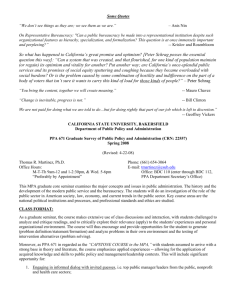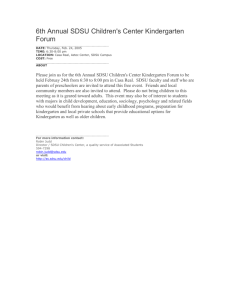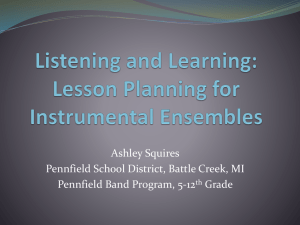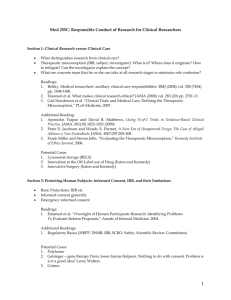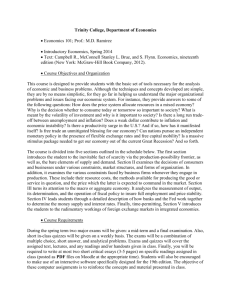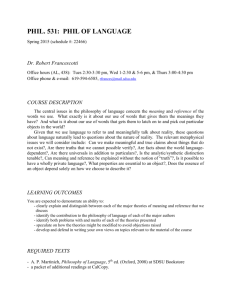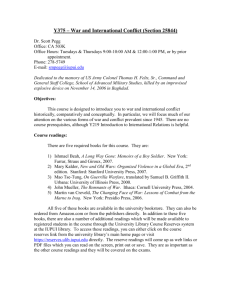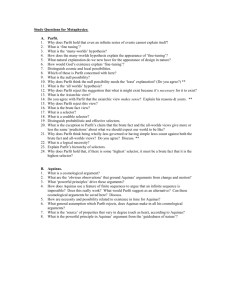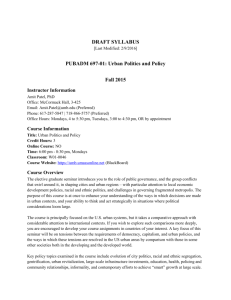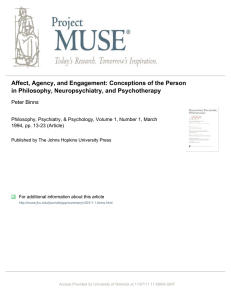Phil 620: Seminar: Personal Identity (Francescotti) (S 2014)
advertisement
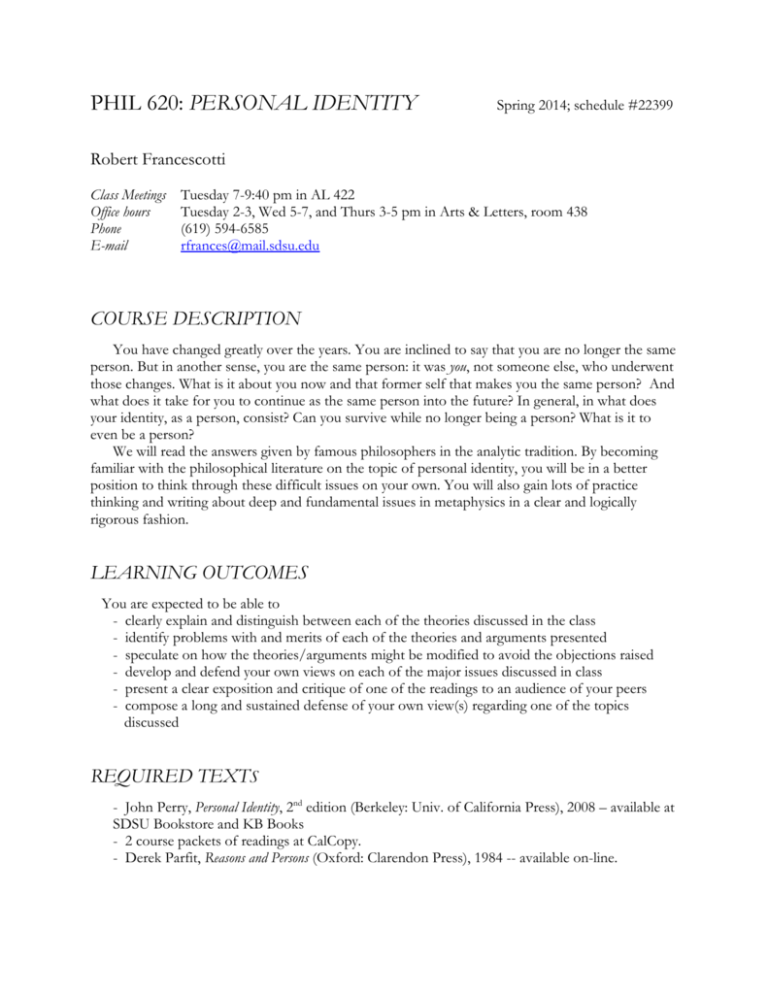
PHIL 620: PERSONAL IDENTITY Spring 2014; schedule #22399 Robert Francescotti Class Meetings Office hours Phone E-mail Tuesday 7-9:40 pm in AL 422 Tuesday 2-3, Wed 5-7, and Thurs 3-5 pm in Arts & Letters, room 438 (619) 594-6585 rfrances@mail.sdsu.edu COURSE DESCRIPTION You have changed greatly over the years. You are inclined to say that you are no longer the same person. But in another sense, you are the same person: it was you, not someone else, who underwent those changes. What is it about you now and that former self that makes you the same person? And what does it take for you to continue as the same person into the future? In general, in what does your identity, as a person, consist? Can you survive while no longer being a person? What is it to even be a person? We will read the answers given by famous philosophers in the analytic tradition. By becoming familiar with the philosophical literature on the topic of personal identity, you will be in a better position to think through these difficult issues on your own. You will also gain lots of practice thinking and writing about deep and fundamental issues in metaphysics in a clear and logically rigorous fashion. LEARNING OUTCOMES You are expected to be able to - clearly explain and distinguish between each of the theories discussed in the class - identify problems with and merits of each of the theories and arguments presented - speculate on how the theories/arguments might be modified to avoid the objections raised - develop and defend your own views on each of the major issues discussed in class - present a clear exposition and critique of one of the readings to an audience of your peers - compose a long and sustained defense of your own view(s) regarding one of the topics discussed REQUIRED TEXTS - John Perry, Personal Identity, 2nd edition (Berkeley: Univ. of California Press), 2008 – available at SDSU Bookstore and KB Books - 2 course packets of readings at CalCopy. - Derek Parfit, Reasons and Persons (Oxford: Clarendon Press), 1984 -- available on-line. READINGS The following are reprinted in Perry’s Personal Identity. John Locke, “Of Identity and Diversity,” chapter 27 of An Essay Concerning Human Understanding (first appearing in the 2nd ed. of Locke’s Essay, 1694). Joseph Butler, “Of Personal Identity,” 1st appendix to The Analogy of Religion (first published in 1736.) Thomas Reid, chs. 4 and 6 of “Of Memory,” from Essays on the Intellectual Powers of Man (first published in 1785). David Hume, secs. 2 and 6 of Book I, Part IV of A Treatise of Human Nature (first published in 1739). H. P. Grice (1941), “Personal Identity,” Mind, vol. 50, pp. 330-350. Anthony Quinton (1962), “The Soul,” The Journal of Philosophy, vol. 59, pp. 393-409. John Perry, “Personal Identity, Memory, and the Problem of Circularity” (first published in the 1st ed. of Perry’s Personal Identity, 1975). Thomas Nagel (1971), “Brain Bisection and the Unity of Consciousness,” Synthese, vol. 22, pp. 396-413. We will also read chapters 10-13 of Derek Parfit (1984), Reasons and Persons (Oxford: Clarendon Press) and the following from the course packets: Susan Wolf (1986), “Personal Interest and Interest in Selves,” Ethics, vol. 96, pp. 704-720. David Lewis (1976), “Survival and Identity,” in A. Rorty (ed.), The Identities of Persons (Berkeley: Univ. of California Press), pp. 17-40. Nicholas Humphrey and Daniel Dennett (1989), “Speaking for Our Selves,” in Dennett, Brainchildren (Cambridge, Mass.: MIT Press), pp. 31-55. Kathleen Wilkes (1981), “Multiple Personality and Personal Identity,” The British Journal for the Philosophy of Science, vol. 32, pp. 331-348. Peter Unger (1979), “I Do Not Exist,” in G. Macdonald (ed.), Perception and Identity (Ithaca: Cornell Univ. Press), pp. 235-251. Peter Unger (1988), “Conscious Beings in a Gradual World,” Midwest Studies in Philosophy, vol. 12, pp. 287-333. Eric Olson (1997), “Was I Ever a Fetus?,” Philosophy and Phenomenological Research, vol. 57, pp. 95110. David Mackie (1999), “Personal Identity and Dead People,” Philosophical Studies, vol. 95, pp. 219242. Eric Olson (1997), The Human Animal (Oxford: Oxford Univ. Press) -- ch. 6. Lynne Baker (1999), “What Am I?,” Philosophy and Phenomenological Research, vol. 59, pp. 151-159. Lynne Baker (2000), Persons and Their Bodies, ch. 4, sec. 1. . . . and more Baker (2002), “The Ontological Status of Persons,” Philosophy and Phenomenological Research, vol. 65, pp. 370-388. 2 Schedule: Meetings & Readings There are 14 meetings during the semester (apart from finals week). Here is a tentative list, a rough approximation, of which readings will be discussed during which meetings. 1. 2. 3. 4. 5. Intro to course and relevant background Locke on identity and personal identity Butler’s and Reid’s objections to Locke’s view Hume on identity passages from Paul Grice and Anthony Quinton John Perry, “Personal Identity, Memory, and the Problem of Circularity” 6. Thomas Nagel, “Brain Bisection and the Unity of Consciousness” Derek Parfit, Reasons and Persons, chapter 10 7. Parfit, Reasons and Persons, chapters 10-12 8. Parfit, chapters 12-13 9. Susan Wolf, “Personal Interest and Interest in Selves David Lewis, “Survival and Identity” 10. Nicholas Humphrey and Daniel Dennett (1989), “Speaking for Our Selves” Kathleen Wilkes, “Multiple Personality and Personal Identity” 11. David Mackie, “Personal Identity and Dead People” Eric Olson, “Was I Ever a Fetus?” 12. Peter Unger, “I Do Not Exist” and “Conscious Beings in a Gradual World” 13. Eric Olson, The Human Animal, ch. 6 Lynne Baker, “What Am I?” 14. Baker, Persons and Their Bodies, ch. 4, sec. 1 and “The Ontological Status of Persons” GRADES & REQUIREMENTS Your final grade is the percentage you earn of 100 possible pts. Weekly Papers (40 pts): At the end of each class, I will assign questions for you to answer in a short paper (2 double-spaced pages) to be handed in at the start of the following class. There will be a total of 12 short paper assignments. You are required to complete at least 8 of them. If you do more than 8, I will count your best 8. Term Paper (35 pts): By 7 pm on May 13, you will submit a 15 page term paper explaining and defending your position on an issue directly related to the material of the course. Presentation (13 pts): During one of the sessions, you will give a presentation on the readings for that week (a clear exposition of the main points expressed in the reading, along with your critique). The presentation will be at least 20 mins, with an additional 10 minutes or so answering questions/comments from the audience. [The presentation may not be done on a week for which you submit a weekly paper, unless there are two distinct reading assignments for that day and the presentation topic is other than the topic for the writing assignment.] 3 Discretionary points (12 pts): Based on class discussion. Improvement in grades and effort will also be considered. Attendance will weigh heavily since that is a necessary condition for even being prepared to discuss (so points will be deducted for each unexcused absence). Evidence that you are not spending enough time with the readings (for example, with an inability to answer questions I ask in class) may also result in loss of points. Percentages and letter grades 92.5% 89.5% 86.5% 82.5% 100% 92.4% 89.4% 86.4% = = = = A AB+ B 79.5% 76.5% 72.5% 72.5% 82.4% = B79.4% = C+ 76.4% = C = F Academic Misconduct: Cheating and Plagiarism It is your responsibility to know and observe all the SDSU rules concerning academic integrity and plagiarism. You should familiarize yourself with SDSU Academic Senate Policy on Plagiarism http://senate.sdsu.edu/policy/pfacademics.html. Here are some highlights: 2.0 Definitions 2.1 Cheating shall be defined as the act of obtaining or attempting to obtain credit for academic work by the use of dishonest, deceptive, or fraudulent means. Examples of cheating include, but are not limited to (a) copying, in part or in whole, from another’s test or other examination; (b) discussing answers or ideas relating to the answers on a test or other examination without the permission of the instructor; (c) obtaining copies of a test, an examination, or other course material without the permission of the instructor; (d) using notes, cheat sheets, or other devices considered inappropriate under the prescribed testing condition; (e) collaborating with another or others in work to be presented without the permission of the instructor; (f) falsifying records, laboratory work, or other course data; (g) submitting work previously presented in another course, if contrary to the rules of the course; (h) altering or interfering with the grading procedures; (i) plagiarizing, as defined; and (j) knowingly and intentionally assisting another student in any of the above. 2.2 Plagiarism shall be defined as the act of incorporating ideas, words, or specific substance of another, whether purchased, borrowed, or otherwise obtained, and submitting same to the University as one’s own work to fulfill academic requirements without giving credit to the appropriate source. Plagiarism shall include but not be limited to (a) submitting work, either in part or in whole, completed by another; (b) omitting footnotes for ideas, statements, facts, or conclusions that belong to another; (c) omitting quotation marks when quoting directly from another, whether it be a paragraph, sentence, or part thereof; (d) close and lengthy paraphrasing of the writings of another; (e) submitting another person’s artistic works, such as musical compositions, photographs, paintings, drawings, or sculptures; and (f) submitting as one’s own work papers purchased from research companies. Student Disability Services “Student Disability Services provides support services for students with mobility limitations, learning disabilities, hearing or visual impairments, psychological disabilities, attention deficit disorder, and other disabilities. Counselors are available to assist students in making personal, academic, and vocational choices, and to advise how best to utilize campus resources. Prior to receiving assistance, 4 students must furnish appropriate medical or psycho-educational documentation to Student Disability Services” (p. 33, 2013-14 General Catalog). Any students with special needs due to a documented medical condition should avail themselves of the resources at Student Disability Services, Calpulli Center, room 3101, (619)594-6473, http://www.sa.sdsu.edu/sds Students who have such concerns that might prevent them from otherwise doing well in this course should discuss this with the instructor so that appropriate arrangements can be made. Religious Observances “By the end of the second week of classes, students should notify the instructors of affected courses of planned absences for religious observances. Instructors shall reasonably accommodate students who notify them in advance of planned absences for religious observances.” (p. 20, 2013-14 General Catalog). Please notify me by the end of the second week of classes if you plan to be absent for “religious observances.” 5
